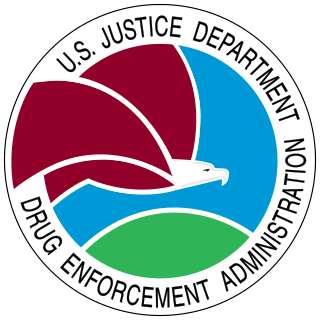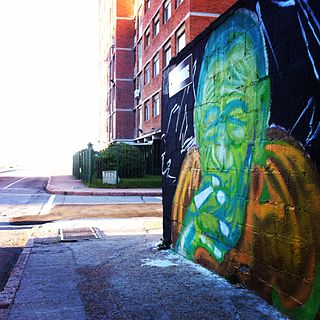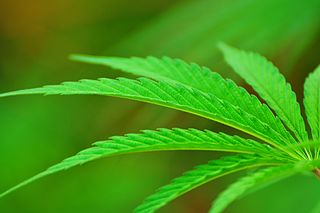Related Research Articles

The Drug Enforcement Administration is a United States federal law enforcement agency under the United States Department of Justice, tasked with combating drug trafficking and distribution within the United States. The DEA is the lead agency for domestic enforcement of the Controlled Substances Act, sharing concurrent jurisdiction with the Federal Bureau of Investigation (FBI), Immigration and Customs Enforcement’s Homeland Security Investigations (HSI), U.S. Customs and Border Protection (CBP), and the Department of Homeland Security (DHS). It has sole responsibility for coordinating and pursuing US drug investigations both domestic and abroad.

This is a list of the annual prevalence of cannabis use by country as a percentage of the population aged 15–64. The indicator is an "annual prevalence" rate which is the percentage of the youth and adult population who have consumed cannabis at least once in the past survey year.
Veterans for Medical Cannabis Access (VMCA), which was founded as Veterans for Medical Marijuana Access (VMMA) reflecting the pejorative word "marijuana", is an Elliston, Virginia-based non-profit service organization designed to assist American veterans who wish to be able to use marijuana for medical purposes with a doctor's recommendation. VMCA works towards the freedom for veterans to discuss the medical use of marijuana with their doctors without the risk of reprisal.

Cannabis is legal in Uruguay, and is one of the most widely used drugs in the nation.
Cannabis in Nigeria is illegal, yet the country is a major source of West African-grown cannabis, and ranked the world's eighth highest consumer of cannabis. Cannabis is widely grown across the States of Nigeria, including Ondo State, Edo State, Delta State, Osun State, Oyo State and Ogun State.
Cannabis in Guyana is illegal for all uses, but is both grown and consumed in the nation. Possession of 15 grams or over can result in charges of drug trafficking.
Cannabis in Cambodia is illegal. This prohibition is enforced opportunistically. Many "Happy" restaurants located in Phnom Penh, Siem Reap and Sihanoukville publicly offer food cooked with marijuana, or as a side garnish.
Cannabis in Dominica is a Class B drug to cultivate, sell or possess. This means that possession is punishable by 12 months and $12,000 (summary) or 2 years and $20,000. Supplying, production, or importation are punishable by 3 years and $100,000 (summary) or 14 years and $200,000.
Cannabis in Luxembourg is decriminalized for recreational use and legalized for medical use. Prosecution depends on the amount of cannabis one possesses. Since 2001, prison penalty has been substituted by a monetary fine ranging from 250 to 2,500 euros.

Cannabis in Pakistan is illegal, although in many parts of the country enforcement is lax. Cannabis is widely consumed in Pakistan as charas and bhang.
Cannabis in Benin is illegal. The country is not a major drug producer or consumer, but increasingly serves as a transshipment point for drugs produced elsewhere. Cannabis is the only drug produced locally in Benin, though mostly on a small scale.
Cannabis in New Caledonia is illegal, but is cultivated illicitly. Sources note that "hard drugs" are rare in New Caledonia, and their drug issues are primarily confined to cannabis, with local Kanak chiefs being anti-drug and working to eradicate cannabis plantations.
Cannabis in Cabo Verde is illegal, but is produced and trafficked illicitly.
Cannabis in Barbados is illegal for recreational use, but the drug is in high demand on the island. Cannabis is sourced from St. Vincent and Jamaica by local dealers who pool resources to buy consignments of the drug, transported by go-fast boats.
The possession and use of cannabis is illegal in El Salvador for both recreational and medical purposes. The country is a signatory of the 1988 United Nations Convention Against Illicit Traffic in Narcotic Drugs and Psychotropic Substances, and has criminalized the production and distribution of the drug.
Cannabis in Antigua and Barbuda is illegal but decriminalized. The islands are not a major producer of cannabis, and instead import the drug from Jamaica and Saint Vincent and the Grenadines.
Cannabis is illegal in the Bahamas.
Cannabis is illegal in the Turks and Caicos Islands. Although the islands are a British Overseas Territory and their legal system is based on English common law, the islands are a separate legal jurisdiction to the United Kingdom and have their own laws.
Cannabis is illegal in the Marshall Islands.
Cannabis in Haiti is illegal with severe punishments for the production, sale, and possession of marijuana for medicinal or recreational purposes.
References
- ↑ William R. Brownfield (May 2011). International Narcotics Control Strategy Report: Volume I: Drug and Chemical Control. DIANE Publishing. pp. 152–. ISBN 978-1-4379-8272-5.
- ↑ Where does Bolivia Stand on Drug Decriminalization and Legalization? | ANDEAN INFORMATION NETWORK
- ↑ Bolivia. druglawreform.info
| This Bolivia-related article is a stub. You can help Wikipedia by expanding it. |
| This Cannabis-related article is a stub. You can help Wikipedia by expanding it. |
